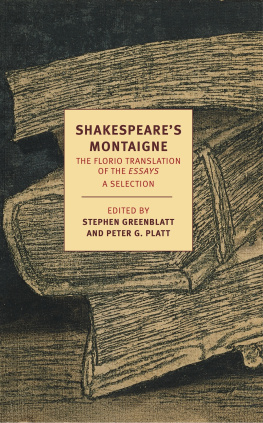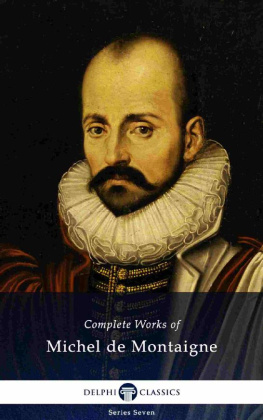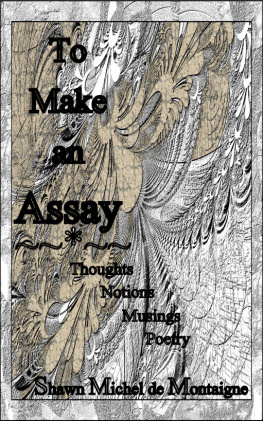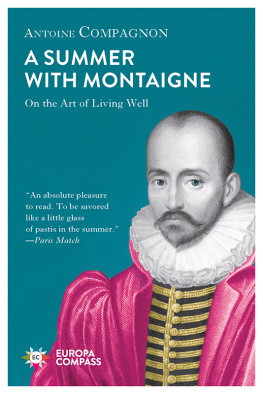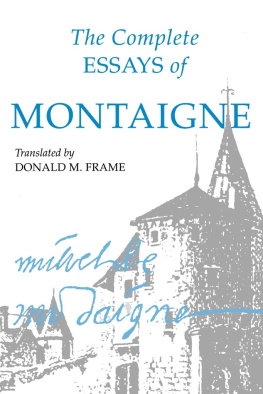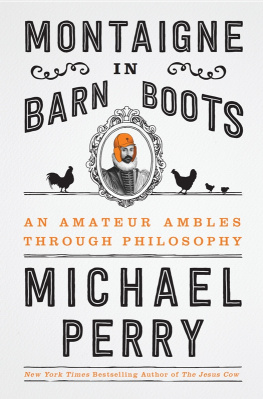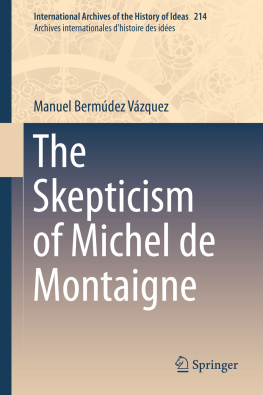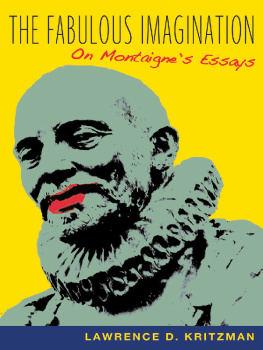Dr Screechs principal achievement has been to render Montaigne into contemporary English without quaintness, but also without sacrifice of that flavour of the sixteenth century which is implicit in Montaignes thinking We want the essence of the man in a form accessible to modern readers, and that is what the translator has so gracefully given us Robertson Davies
An absolute treat [Screech] is the master of Montaigne. Hes already written extremely eloquently about Michel Montaigne as a melancholy man. Theres a kind of liveliness, a vernacular about the translation here that works very well Roy Porter on Kaleidoscope, BBC Radio Four
Of its [the translations] limpidity and charm there can be no question Simon Raven in the Guardian
This thinking tome, edited by a fine scholar, is utterly readable as fine scholars should be. It is more easily picked up than put down, and should be on the bedside table of every homme moyen sensuel, or lady for that matter Anthony Blond in the Evening Standard
Most of all, mention should be made of the other greatly original feature of this translation, the commentary [which] constitutes a fascinating sixteenth-century honnte hommes library. For this reason the French reader will turn to the translation of M. A. Screech, who takes his place among those who, crossing cultural boundaries, enable each country to rediscover its writers in a new light Jean-Robert Armogathe in Bibliothque dHumanisme et Renaissance
Anglophones of the next century will be deeply in [Dr Screechs] debt Gore Vidal in The Times Literary Supplement
ABOUT THE AUTHOR AND EDITOR
MICHEL EYQUEM, Seigneur de Montaigne, was born in 1533, the son and heir of Pierre, Seigneur de Montaigne (two previous children dying soon after birth). He was brought up to speak Latin as his mother tongue and always retained a Latin turn of mind; though he knew Greek, he preferred to use translations. After studying law he eventually became counsellor to the Parlement of Bordeaux. He married in 1565. In 1569 he published his French version of the Natural Theology of Raymond Sebond; his Apology is only partly a defence of Sebond and sets sceptical limits to human reasoning about God, man and nature. He retired in 1571 to his lands at Montaigne, devoting himself to reading and reflection and composing his Essays (first version, 1580). He loathed the fanaticism and cruelties of the religious wars of the period, but sided with Catholic orthodoxy and legitimate monarchy. He was twice elected Mayor of Bordeaux (1581 and 1583), a post held for four years. He died at Montaigne in 1592 while preparing the final, and richest, edition of his Essays.
M. A. SCREECH is an Honorary Fellow of Wolfson College and an Emeritus Fellow of All Souls College, Oxford (Fellow and Chaplain, 20013), a Fellow of the British Academy and of the Royal Society of Literature, a Fellow of University College London, and a corresponding member of the Institut de France. He long served on the committee of the Warburg Institute as the Fielden Professor of French Language and Literature in London, until his election to All Souls. He is a Renaissance scholar of international renown. He has edited and translated both the complete edition and a selection of the Essays for Penguin Classics and, in a separate volume, Montaignes Apology for Raymond Sebond. His other books include Erasmus: Ecstacy and the Praise of Folly (Penguin, 1988), Rabelais, Montaigne and Melancholy (Penguin, 1991) and, most recently, Laughter at the Foot of the Cross (Allen Lane, 1998). All are acknowledged to be classics studies in their fields. He worked with Anne Screech on Erasmus Annotations on the New Testament. Michael Screech was promoted Chevalier dans lOrdre du Mrite in 1982 and Chevalier dans la Lgion dHonneur in 1992. He was ordained, in Oxford, a deacon in 1994 and a priest in 1995.
MICHEL DE MONTAIGNE
The Complete Essays
Translated and edited with an
Introduction and Notes by M. A. SCREECH
PENGUIN BOOKS
PENGUIN BOOKS
Published by the Penguin Group
Penguin Books Ltd, 80 Strand, London WC2R 0RL, England
Penguin Putnam Inc., 375 Hudson Street, New York, New York 10014, USA
Penguin Books Australia Ltd, 250 Camberwell Road, Camberwell, Victoria 3124, Australia
Penguin Books Canada Ltd, 10 Alcorn Avenue, Toronto, Ontario, Canada M4V 3B2
Penguin Books India (P) Ltd, 11 Community Centre, Panchsheel Park, New Delhi 110 017, India
Penguin Books (NZ) Ltd, Cnr Rosedale and Airborne Roads, Albany, Auckland, New Zealand
Penguin Books (South Africa) (Pty) Ltd, 24 Sturdee Avenue, Rosebank 2196, South Africa
Penguin Books Ltd, Registered Offices: 80 Strand, London WC2R 0RL, England
www.penguin.com
Book II, Chapter 12 previously appeared as An Apology for Raymond Sebond,
published in Penguin Books 1987
The Complete Essays first published by Allen Lane The Penguin Press 1991
Reprinted with corrections and a new Chronology 2003
20
This translation and editorial material copyright M. A. Screech 1987, 1991, 2003
All rights reserved
The moral right of the translator has been asserted
Except in the United States of America, this book is sold subject to the condition that it shall not, by way of trade or otherwise, be lent, re-sold, hired out, or otherwise circulated without the publishers prior consent in any form of binding or cover other than that in which it is published and without a similar condition including this condition being imposed on the subsequent purchaser
9780141915937
In Memory of
PHILIP EVELEIGH
Wit, poet, scholar
killed during the Allied
landings in Italy
Table of Contents
Explanation of the Symbols
[Summary of the Symbols repeated on p. 1284]
Introduction

Montaigne is one of the great sages of that modern world which in a sense began with the Renaissance. He is a bridge linking the thought of pagan antiquity and of Christian antiquity with our own. Colourful, practical and direct, and never intentionally obscure, he sets before us his modestly named Essays, his attempts at sounding himself and the nature and duties of Man so as to discover a sane and humane manner of living. He enjoys a place apart among French Renaissance authors. Men and women of all sorts are fascinated by what they find in him. Many read him for his wisdom and humanity, for which he may be quoted in a newspaper as readily as in a history of philosophy. He writes about himself, but is no egocentric and is never a bore. He treats the deepest subjects in the least pompous of manners and in a style often marked by dry humour. His writings are vibrant with challenge; they are free from jargon and unnecessary technicalities. In the seventeenth century, Pascal, the great Jansenist author of the Penses (Thoughts which owe much to Montaigne), was converted partly by reading him and was soon discussing the Essays at Port-Royal with his director, LeMaistre de Sacy (who had his reservations). Pascal gained, it is said, thirty years by reading Montaigne, thirty years of study and reflection. Others, too, have felt the same. For Montaigne gives his readers the fruits of his own reading and of his own reflections upon it, all measured against his personal experience during a period of intellectual ferment and of religious and political disarray. Montaigne never let himself be limited by his office or station. As husband, father, counsellor, mayor, he kept a critical corner of himself to himself, from which he could judge in freedom and seek to be at peace with himself. He does not crush his reader under the authority of the great philosophers: he tries out their opinions and sees whether they work for him or for others. For he knew that opinions are not certainties, and that most human certainties are in fact opinions.


